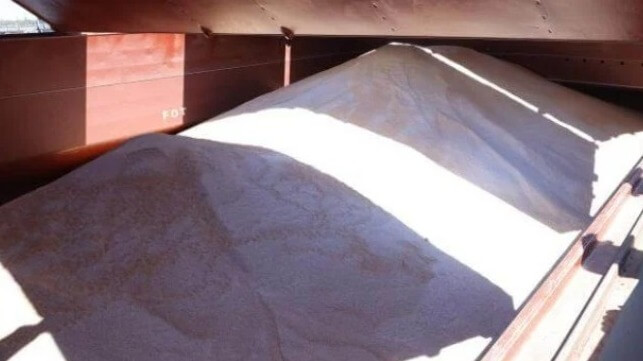Ukraine Asks Turkey to Ban Stolen Grain Cargoes From the Bosporus

Ukraine's ambassador to Turkey has called on the Turkish government to prohibit cargoes of stolen Ukrainian grain from crossing the Bosporus. Ukraine asserts that Russian forces are stealing wheat and other commodities from inside occupied territories in Ukraine, then trucking them into Crimea for export to overseas destinations.
One such cargo has already been tracked to the port of Latakia, Syria. Ukrainian officials claim that the Russian bulker Matros Pozynich loaded a cargo of 27,000 tonnes of stolen grain in Crimea, then transited to Latakia, where the AP and Planet Labs spotted her via satellite imaging. Syria's isolated and sanctioned government is closely aligned with Russia; Ukrainian intelligence assesses that the stolen grain will be laundered through the Syrian market for sale in neighboring countries.
In a statement on Sunday, Ukrainian ambassador to Ankara Vasyl Bodnar claimed that a second vessel had taken on a load of grain at Sebastopol and was headed for the Bosporus. He identified the ship as the Syrian-flagged Finikia, a small geared bulker of about 19,000 dwt. Bodnar called on Turkish authorities to take measures to prevent the vessel from transiting the Bosporus or calling at Turkish seaports.
Finikia is one of three ships owned by Syriamar, the state-owned shipping agency of the Syrian government. The company is blacklisted on the United States Treasury's sanctions list for its connections to Syrian dictator Bashar al-Assad and his military forces. Despite U.S. sanctions, Syriamar's vessels have a long history of operating between Turkish ports and Sebastopol.
Over the past two months, Finikia has twice transited north through the Bosporus and disappeared from satellite AIS tracking, indicating that her crew has turned off AIS upon entering the Black Sea. Her signal reliably reappears upon her return to the Turkish Straits VTS zone, where AIS transmission is required.
Though AIS data is not available for Finikia's Black Sea voyages, Ukrainian open-source intelligence researchers obtained webcam footage of the vessel entering Sebastopol's harbor and calling at a grain terminal on May 11. Her AIS reappeared in the Black Sea on May 14, and she was photographed passing through the Bosporus on the following day.
Finikia: pic.twitter.com/ocQEIEeCwg
— Yörük I??k (@YorukIsik) May 15, 2022

that matters most
Get the latest maritime news delivered to your inbox daily.
Despite Amb. Bodnar's request, Finikia completed her transit and headed south, bypassing Turkish seaports. As of Tuesday evening, her AIS signal showed her located north of Cyprus, headed east on a previously-used route towards Syria.
In addition to sanctions and alleged theft, Finikia has a history of deficiencies. She was detained at Iskenderun last September due to a range of issues, including faults with her auxiliary power, EPIRB and pollution-prevention equipment. Port state inspectors in Russia, Tunisia, Lebanon, Turkey, Romania and Egypt found deficiencies at every previous boarding of the Finikia since 2017.
